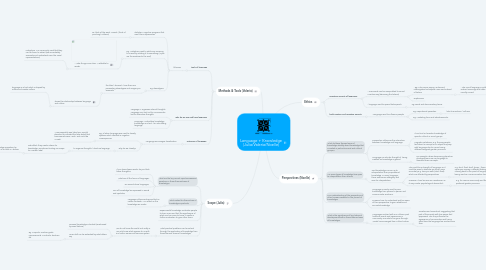
1. Methods & Tools (Valeria)
1.1. tools of language
1.1.1. Schemas
1.1.1.1. defintion: cognitive programs that result from experiences
1.1.1.1.1. ex: think of the word "smash" (think of punching/ collision)
1.1.1.2. Eg: Metaphors used to add more meaning to a word by relating it to something (“eyes are the windows to the soul)
1.1.1.2.1. - Make things more clear + relatable to reader
1.1.1.3. eg: stereotypes
1.1.1.3.1. the label "terrorist", how there are preexisting stereotypes and images you associate
1.2. why do we use and have language
1.2.1. Language = organises internal thoughts Language as a tool not to communicate but to internalise thoughts
1.2.2. Language = articulates knowledge knowledge as a tool - for articulating language
1.3. criticisms of language
1.3.1. Language encourages classification
1.3.1.1. Eg: of when language was used to classify systems which resulted in negative consequences.
1.3.1.1.1. - Homosexuality was listed as a mental disorder, this created the false belief that homosexuals were “sick” and could be “cured”
1.3.1.2. why do we classify?
1.3.1.2.1. to organise thoughts / structure language
2. Scope (Julia)
2.1. What are the key current open/unanswered questions in these themes/areas of knowledge?
2.1.1. If you know fewer words, do you think fewer thoughts?
2.1.2. What are all the forms of language?
2.1.3. Do animals have language?
2.1.4. Can all knowledge be expressed in words and symbols?
2.2. What makes this theme/area of knowledge important?
2.2.1. Language influences how we think is certain contexts, = an effect on the knowledge we create
2.3. Experimental knowledge motivates people to learn more and feel the significance of what one has come to know = results in further motivation to gain other forms
2.4. What practical problems can be solved through the application of knowledge from these themes/ areas of knowledge?
2.4.1. We do not know the world as it really is. We only know what appears to us with our human senses and nervous system
2.4.1.1. Personal knowledge is limited (constrained by ones lifetime)
2.4.1.2. One's skill can be extended by what others say
2.4.1.2.1. Eg. In sports, coaches guide improvements. In schools, teachers do
3. Ethics
3.1. Negative aspects of language:
3.1.1. - How words can be manipulated to sound a certain way (deceiving the listener)
3.1.1.1. - Eg: Mike Pence saying “enhanced interrogation techniques” was used instead of torture
3.1.1.1.1. - The use of language in politics is used to redirect meanings and make sound more morally correct.
3.1.1.2. euphemism
3.1.2. - language used to spread hate speech.
3.1.2.1. eg: Racist and discriminatory terms.
3.2. both positive and negative aspects
3.2.1. - Language used to influence people
3.2.1.1. Eg: inspirational speeches.
3.2.1.1.1. links to emotions / cultures
3.2.1.2. Eg: Marketing firms and advertisements.
4. Perspectives (Noelle)
4.1. What do these themes/areas of knowledge identify about knowledge that is rooted in particular social and cultural groups?
4.1.1. Perspective influences the interaction between knowledge and language
4.1.1.1. It can limit or broaden knowledge of specific cultural or social groups
4.1.1.2. Linguistic Relativism: e.g. the way people feel about a concept or an object may way with language due to nouns having different assigned gender pronouns.
4.1.2. Language can also be thought of being created, as knowledge is gained
4.1.2.1. For example, when discovering planets or photosynthesis, we use language to describe those concepts.
4.2. Are some types of knowledge less open to interpretation than others?
4.2.1. Tacit knowledge is more up to interpretation than propositional knowledge. In every language, there exist some ambiguity and area for interpretation.
4.2.1.1. This could be a strength of language, as it could be seen to describe an action more accurately e.g. how you walk (strut, float), which are affected by perspectives
4.2.1.1.1. e.g. strut, float, stroll, tramp - these synonyms convey a different feeling, hence coming back to the point of language being used as a communication tool.
4.2.1.2. However, it can be seen as a weakness, as it may create 'psychological discomfort'.
4.2.1.2.1. e.g. for LGBTQ community and their preferred gender pronouns
4.3. Is an understanding of the perspective of other knowers essential in the pursuit of knowledge?
4.3.1. Language is mainly used to pass knowledge from person to person and communicate emotions.
4.3.2. Knowers have to understand and be aware of their perspective to gain reliable and accurate knowledge
4.4. What is the significance of key historical developments within these themes/areas of knowledge?
4.4.1. Languages evolved with our cultures, past historical events and experiences a community as a whole has gone through. Words have emerged from cultural values
4.4.1.1. Societies are hierarchical, suggesting that part of the society with less power feel oppressed. This may influence the experience of communities and hence affect how the language has evolved from then.
